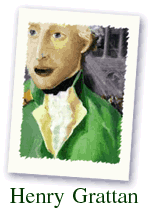�
Henry Grattan's Parliament
For most of the eighteenth century, the Irish parliament in Dublin was prepared to accept a subordinate role. In return, England would always defend Protestant interests in Ireland. Under Porings' Law, passed in the fifteenth century, no Irish act could pass without the approval of the king and his advisers in England. The viceroy in Dublin Castle was a member of the British government. In 1720, a Westminster act known as  "the Sixth of George I" gave the British parliament the right to pass laws for Ireland. The only weapon of the Irish house of commons, now wholly Protestant and largely controlled by wealthy landlords, was its powers of taxation.
"the Sixth of George I" gave the British parliament the right to pass laws for Ireland. The only weapon of the Irish house of commons, now wholly Protestant and largely controlled by wealthy landlords, was its powers of taxation.
Irish agriculture was generally inefficient, and manufacturing trades suffered from restrictions imposed to protect English merchants. British policies were challenged by writers such as Jonathan Swift, Bishop George Berkeley and Charles Lucas, founder of the Freeman's Journal. Within the Irish parliament itself, a reforming group known as "patriots" eventually emerged, led by Henry Flood and the Earl of Charlemont. They believed that a more representative assembly would, while preserving the Protestant interest, achieve more for Irish commerce.
In 1775 Flood accepted a government post, and leadership of the patnots passed to Henry Grattan, a young lawyer whom Charlemont had brought into parliament. With the outbreak of rebellion in the American colonies, followed by French and Spanish intervention, Britain was forced to withdraw troops from Ireland. Fears of a French invasion led to the formation of a Protestant militia, the Volunteers. Charlemont became their leader, and the Volunteers threw themselves behind the demands for reform. Bending to Grattan's oratory, a fearful government removed most of the trade restrictions in 1779, and in 1782 Irish parliamentary independence was conceded. Westminster repealed the 1720 act, and the Irish parliament removed the most oppressive parts of Poynings ' Law.
"Grattan's parliament" is the name usually given to the two decades of parliamentary independence which ended with the Act of Union in 1800. Certainly, there was much celebration in 1782, and parliament voted its hero £50,000 in gratitude. The final years of the century saw great commercial activity, and a prosperous Dublin acquired many of the handsome Georgian buildings for which it is noted today. However, Grattan soon faced a challenge from the embittered Flood, now out of offfice, who questioned Grattan's achievement and forced a further Renunciation Act from Westminster commons in 1783. In November 1783, a Volunteer convention in Dublin drew up a plan for parliamentary reform which Flood presented as a bill. It was immediately rejected by the Irish parliament, whose members refused to be coerced by an armed assembly, and the convention dispersed. The unity of the "Protestant nation" had been destroyed, and the Volunteer movement gradually disintegrated.
Volunteer convention in Dublin drew up a plan for parliamentary reform which Flood presented as a bill. It was immediately rejected by the Irish parliament, whose members refused to be coerced by an armed assembly, and the convention dispersed. The unity of the "Protestant nation" had been destroyed, and the Volunteer movement gradually disintegrated.
To its credit, the Irish parliament eased the penal laws, and in 1793 Catholics gained the nght to vote. However, a property qualification restricted the franchise, and the bulk of seats were still controlled by a few wealthy Protestants. Nor were Catholics allowed to sit as MPs. It was a fundamentally unstable position, given that the population was overwhelmingly Catholic, and far sighted Protestants began to consider that their ascendancy could only be maintained in a United Kingdom of Great Britain and Ireland. The rebellion of the United Irishmen in 1798 convinced the government of the need for change. When its first Bill of Union was rejected by the Irish house of commons, the government embarked on a cynical programme of bribery, buying votes with offers of titles, government posts and compensation. In 1800, dressed in Volunteer uniform, an ailing Grattan begged the commons not to agree to the Union. For once his oratory was in vain, and parliament voted itself out of existence.
 Volunteer convention in Dublin drew up a plan for parliamentary reform which Flood presented as a bill. It was immediately rejected by the Irish parliament, whose members refused to be coerced by an armed assembly, and the convention dispersed. The unity of the "Protestant nation" had been destroyed, and the Volunteer movement gradually disintegrated.
Volunteer convention in Dublin drew up a plan for parliamentary reform which Flood presented as a bill. It was immediately rejected by the Irish parliament, whose members refused to be coerced by an armed assembly, and the convention dispersed. The unity of the "Protestant nation" had been destroyed, and the Volunteer movement gradually disintegrated.
 "the Sixth of George I" gave the British parliament the right to pass laws for Ireland. The only weapon of the Irish house of commons, now wholly Protestant and largely controlled by wealthy landlords, was its powers of taxation.
"the Sixth of George I" gave the British parliament the right to pass laws for Ireland. The only weapon of the Irish house of commons, now wholly Protestant and largely controlled by wealthy landlords, was its powers of taxation.